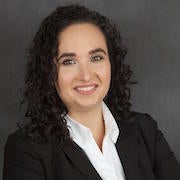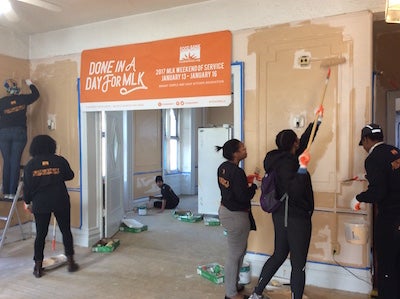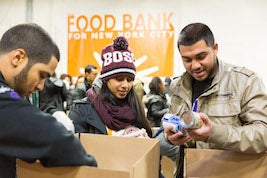When she arrived at Harvard College in the fall of 1994, Triada Stampas AB '98 was certain she was going to be a doctor—a conviction she could trace back to her earliest memories growing up in Queens, New York. But over the course of the next four years in Cambridge, Stampas discovered that her true passion was not for medicine, but for public service.
"My childhood dream was to become a doctor, but I came to realize that the big motivator for me was the opportunity to use my time, my labor, and my talent to create some public good," she says. "And that led me to a career that I would never have anticipated before I started college."
Armed with this newfound purpose and a degree in social anthropology, Stampas returned to New York City after graduation and worked for several years in city government. She then transitioned to the nonprofit sector, taking a job at Food Bank For New York City, where she currently serves as vice president for research and public affairs.
Stampas spoke with the Harvard Alumni Association about her path from Harvard to a career in public service.
How did your experience at the College influence your interest in public service?
 Public service was a big part of my Harvard experience. One of first things I did as a student was the First-Year Urban Program. I was assigned to help a food rescue and soup kitchen program in Jamaica Plain move into a new facility. Looking back, it's amazing how things have come full circle.
Public service was a big part of my Harvard experience. One of first things I did as a student was the First-Year Urban Program. I was assigned to help a food rescue and soup kitchen program in Jamaica Plain move into a new facility. Looking back, it's amazing how things have come full circle.
I feel incredibly lucky for the opportunities that Harvard gave me. I have volunteered to interview applicants for Harvard since I graduated, and when I talk to prospective students, one of the things I tell them is to consider your college years as an opportunity for broadening before life forces you to narrow. The freedom to explore intellectual passions and interests took me off my narrow focus on becoming a doctor and led me to reevaluate and reassess my career path.
How did you pursue that interest after graduating?
My first job out of college was as an investigator for New York City's Civilian Complaint Review Board (CCRB), the agency that investigates allegations of police abuse and misconduct. It was fascinating, it was intense, and it taught me a lot. One of the things it taught me was that if I wanted to affect an issue, doing so case by case was not for me.
I started a master's program in public administration while I continued working, and I ultimately left the CCRB after two years there to complete my MPA at Columbia's School of International and Public Affairs. It hit me partway through my studies that it would be absurd to claim I had any advanced knowledge of urban policy if I had no experience in urban politics, so I decided to volunteer on a campaign to learn how people get themselves elected in New York City. The City Council district I was living in at the time had one of the most competitive races. My candidate (Eric Gioia) won, and he invited me to be his chief of staff. I had exposure to issues running the full spectrum of urban policy, from transportation to sanitation to public health. We were able to get a lot done on many important issues, including removing barriers to access in the food stamp program.
How did you get involved with food policy issues?
When I left the City Council, I couldn't think of a good role for myself in a private sector venture. I had a strong rolodex of advocacy groups and nonprofit service providers, so I networked and I was able to find a position as director of government relations at Food Bank For New York City. Having worked on issues of access and need, I thought I could add value and do some good in service to a mission that I think is very important. My position has evolved and grown since I first got here. I now oversee not only our government relations, but also our research and evaluation work and our marketing and communications. I have been at Food Bank almost nine years, and I'm still here because I'm still learning.
 What is the most rewarding aspect of your work?
What is the most rewarding aspect of your work?
The work we do locally has the potential to influence conversations nationally about the existence of a safety net against hunger in this country—what it's for and why it needs to be protected and strengthened. It is a project in empowerment, building the conduit for people's voices to be heard and to be amplified. Our network is largely volunteers; the typical food pantry in New York City does not have a single paid staff member. People are in this work for their own passion and their own compassion for their fellow New Yorkers. We're helping them to channel what they know to educate our elected representatives, who are able to make decisions on behalf of our network and the people we serve.
The most challenging?
The invisibility of hunger. Nobody identifies themselves as a hungry person. Of the nearly 1.4 million New York City residents who rely on food pantries and soup kitchens, only about 10 percent are homeless and close to double that are working people. They have jobs, but they're struggling to put food on the table because those jobs don't pay enough. That's what I mean when I talk about invisibility; you don't know just from looking at someone.
What advice would you give to Harvard students and alumni who are considering a career in public service?
If you're wondering if it might be for you, explore it. Look for internship opportunities and mentorship opportunities and find out what it's really like. I had a bunch of misconceptions, and my eyes were really opened by the realities. I'm not saying that every workplace is perfect, but I was able to find a professional home in places where I felt valued and supported. Giving yourself the chance to pursue that interest is half the battle, then see where it takes you.
Learn more about Food Bank For New York City.
 Fast Facts: Food Bank For New York City
Fast Facts: Food Bank For New York City